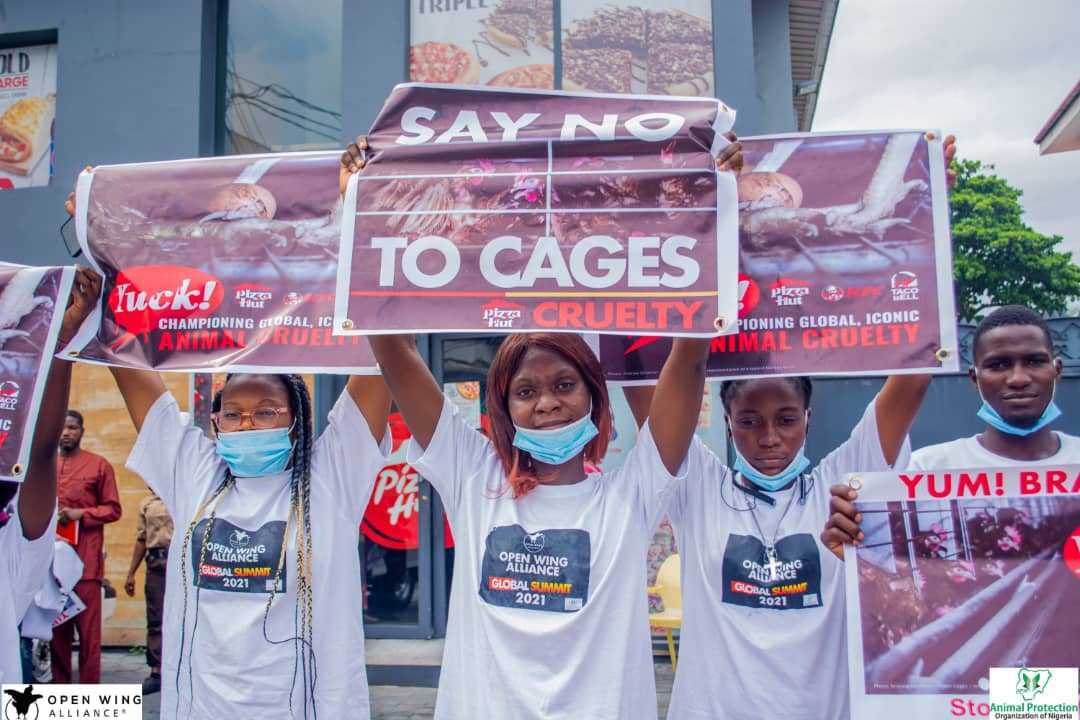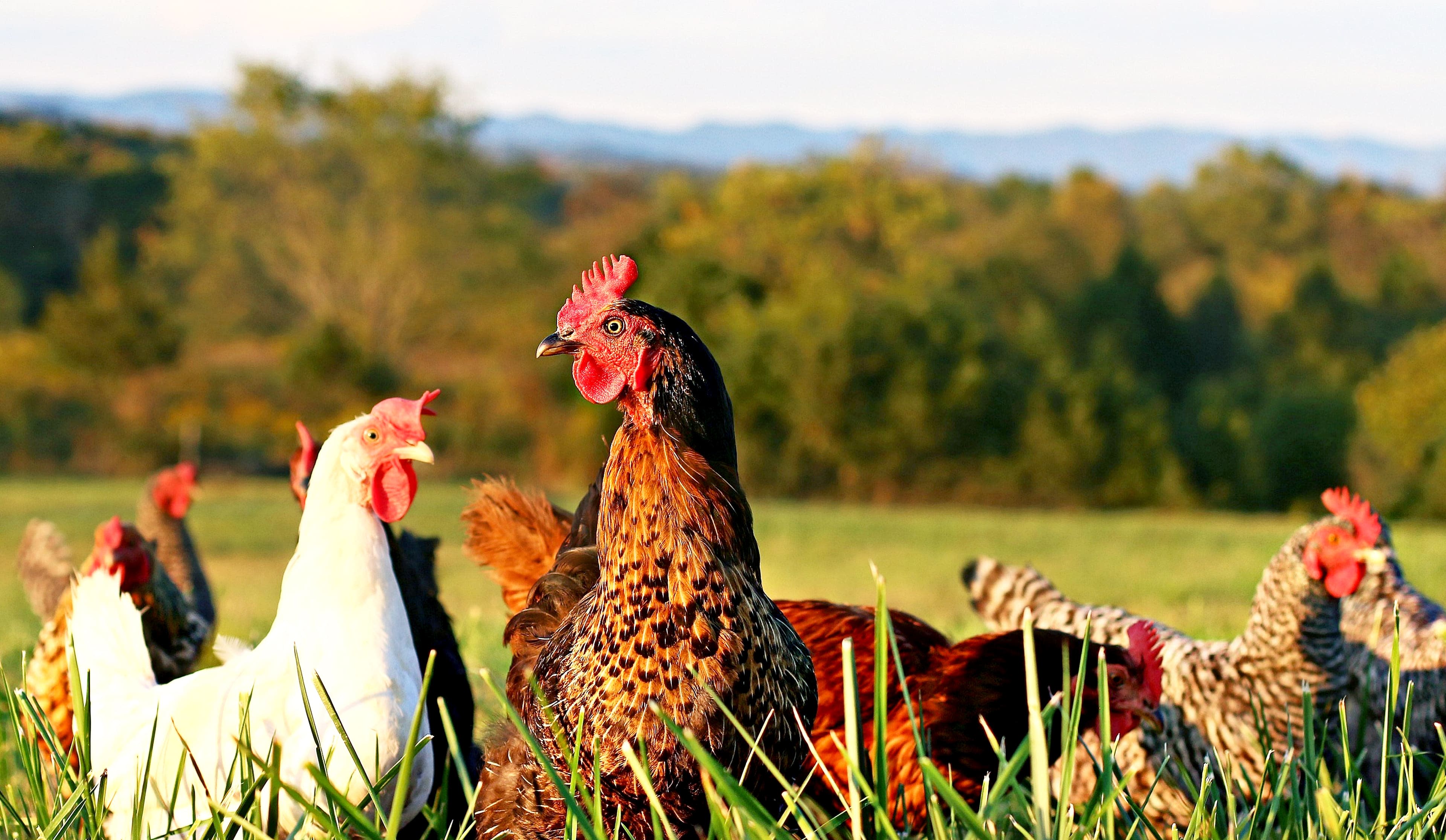




At a time when the world can seem like a scary and uncertain place, we take strength in being part of a global, collaborative force for change.

Right now, the world is going through a lot of turmoil. Amidst it all, the suffering of animals raised for food is a huge, international problem. And global trade means that the way animals are treated in other countries affects the products people buy here in the UK.
We know we need to collaborate with other organisations across the world in order to end the abuse.
That’s why, in 2016, we created the Open Wing Alliance (OWA), a coalition of animal protection organisations standing up for chickens - now reaching over 80 groups across six continents.
Together, we work to create a stronger movement; collaborating on public-facing campaigns, sharing resources and learnings, and training other nonprofits. In this way, we enable supporters like you to take part in global campaigns to make real change for animals across the world, not just on your doorstep.
Animal cruelty is not restricted by borders. The OWA allows us to unite, coordinate, strategise and be inspired by international colleagues all over the globe and gives us the best chance to reduce the suffering of billions of animals.
~ Alex Suchy, THL UK
The first caged hen protest in Nigeria
In May 2021, the OWA supported the first ever protest for chickens in Nigeria. Activists took to the streets to protest against cages, making their voice heard for hens confined behind bars.
Protesters in Nigeria hold up banner reading 'say no to cages'

This protest made history. In countries where animal welfare is less advanced, having the support of a global community is invaluable in the fight against animal abuse.
International collaboration is important for animals because joint effort affects the local communities and the animals involved directly. It helps advocacy messages to spread across the world and triggers public opinions much faster.
~ Joseph Odika, Animal Protection Organization of Nigeria
It means that no one is alone in the fight, we are all connected to people all around the world who care as much as we do about animals.
A cage-free city
Thanks to the work of local campaigners and with the support of the OWA, Quito in Ecuador became a totally cage-free city.
It banned the use of cages, as well as the cruel practice of debeaking. It’s an historic win for hens, and the first instance (hopefully of many) in Latin America.
It’s amazing to see so many people working to make this world a better place for animals. It’s great to connect with other organizations, learn more about what they are doing and collaborate on projects that can impact a large number of animals.
~Eduarda Nedeff, Sinergia Animal
Spreading awareness in Indonesia
While barren battery cages are banned in the UK (we still have so-called ‘enriched’ cages for hens), this is still the predominant method of farming hens in many countries. Indonesia is one of them.
Awareness is a crucial step towards change. Earlier this year, Animal Friends Jogja (AFJ) conducted a survey showing that as many as 81% of people asked did not know what the battery cage system was.
This needs to change.
In June, the group ran an awareness campaign around battery cages through direct dialogue, distributing brochures, comics, stickers, and sharing videos with the facts about cages.
A stall in Indonesia with information about cages hens
As well as raising awareness within the public, the campaign attracted media coverage, spreading the message further afield.
Banning export by sea
Another OWA member group, SAFE, has been campaigning in New Zealand for many years. Their latest target? The live export of animals by sea.
Farmed animals can travel long distances to other countries, terrified and sometimes injured. When they arrive, they can face worse conditions than those they left, as some countries have lower welfare standards than others.
In April, SAFE announced that they had won their battle, with the New Zealand Government planning to phase out export by sea within two years.
Asia
These successes around the world are often gained from companies as global policies, meaning they will be implemented in all countries that the company operates in. This is especially powerful as it affects animal welfare in places like Asia, where getting companies to change on a local level is more difficult.
Our counterpart in Asia, The Humane League Japan, has been making huge steps in the cage-free movement.
Just this month, the Cabinet Office restaurant run by Japan's largest food contractor, Nikko Trust, went cage-free after years of negotiations.
This is a key win, as it’s the first government cafeteria in Japan to go 100% cage-free. We hope it will set an example for other government agencies to follow.
Cage-free Europe
Incremental change works. The more companies we get to improve welfare for animals, the more it becomes the norm, the higher the likelihood that it will become law.
In February, Northern Europe’s largest egg producer, Balticovo, announced a commitment to phase out cage systems by 2026.
This will have a huge effect on the 2.15 million hens this company was keeping in cages, 88% of those in the country of Latvia.
A hen looks out from behind bars of a cage
Just four years earlier, the company had said that no one would ever need cage-free eggs in Latvia. What changed? Company after company switched their welfare policies, turning their backs on eggs from caged hens. Their supplier, Balticovo, simply had to satisfy that demand for cage-free or lose business.
And, there is incredibly encouraging news from the European Commission, who have announced plans to introduce legislation banning cages by 2027, which will address many of the welfare issues that animals like hens face every day.
In the OWA, all groups are willing to collaborate and share knowledge which helps us continually grow and be more impactful.
~Abby Sarfas, THL UK
Want to hear more?
These are just a few of the successes happening around the world for animals.
Each month we hear more about the incredible work that the member groups of the OWA are doing. And it’s all vital.
We know farmed animals are suffering in their billions globally. And we can only fight this abuse by creating a global movement.
To join this movement, sign up to our emails.

 Holly Spindler
Holly Spindler







